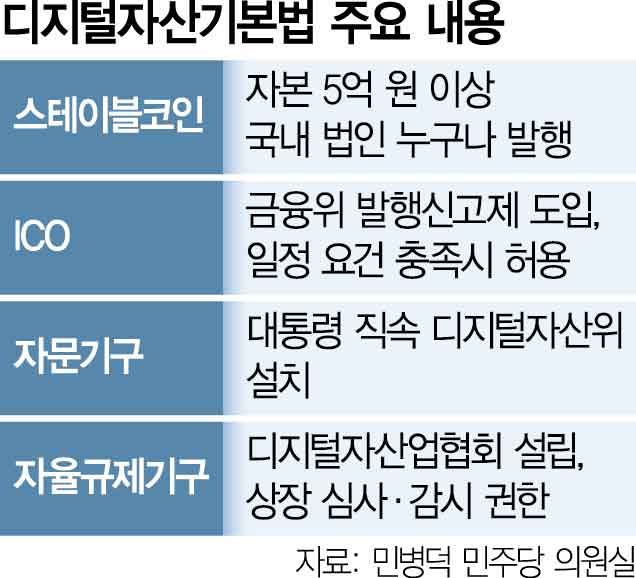
Samsung Electronics and Kakao, along with other qualified private companies, will now be able to issue stablecoins linked to legal tender. Initial Coin Offerings (ICOs), which were essentially blocked in South Korea, can now be legally pursued. ★Refer to pages 1 and 11 of this newspaper on June 10
Min Byung-deok, a member of the National Assembly's Political Affairs Committee from the Democratic Party (and chairman of the Digital Asset Special Committee), proposed the 'Digital Asset Basic Law' on the 10th, which contains these provisions.
Related Articles
- Wavebridge: "Digital Asset Law Will Be a Turning Point for Industry Ecosystem" [Bitcoin Seoul 2025]
- Busan Digital Asset Exchange to Support Non-Fungible Token Game Item Trading... Collaborates with M Game and Busan University of Foreign Studies
- From Mining to Payment and Security... "Korea Focused on Trading, Needs to Nurture 30 Digital Asset Innovation Companies"
- Democratic Party Establishes 'Digital Asset Committee' in Campaign Headquarters... Accelerating Cryptocurrency Policy
The bill classifies digital assets into asset-linked digital assets (stablecoins) and general digital assets, applying different issuance requirements. The term "virtual asset" has been replaced with "digital asset". For stablecoins, there are no restrictions on the issuing corporation - both for-profit and non-profit organizations are eligible. Corporations established in Korea with over 500 million won in equity can issue stablecoins. This structure allows various industries to enter the stablecoin market. Professor Kang Hyung-gu from Hanyang University's Finance and Management Department, who participated in reviewing the bill, stated, "If Samsung Electronics' Samsung Pay is prevented from issuing a stablecoin due to financial-industrial separation, it cannot compete with Apple Pay and PayPal on the global stage." The lawmaker also explained, "The key to financial-industrial separation is that the entity providing loans should not be the same as the one receiving loans. In this new industrial domain, we should actively utilize Korea's assets while issuing a won-based stablecoin to protect monetary sovereignty."
For dollar-based stablecoins, no significant regulations will be introduced, as it is impossible for the Korean government to regulate them.
ICOs, long desired by the industry, will also be permitted. ICOs are similar to Initial Public Offerings (IPOs) in the stock market, where companies raise funds by issuing digital assets. Until now, Korea has applied shadow regulations effectively restricting ICOs without clear prohibitive clauses. According to the bill, to issue digital assets in Korea, companies must submit an issuance registration to the Financial Services Commission and undergo an approval process. However, for assets like Bitcoin without a specific issuer or those issued overseas, there is no reporting obligation. Notably, the FSC cannot reject the registration unless there are specified reasons such as formal requirement deficiencies or important information omissions.
The presidential advisory body 'Digital Asset Committee' will be composed of up to 30 members, including a private sector chairperson, with more than two-thirds of members being private sector individuals. The lawmaker emphasized that the committee could be established even before the bill passes, given presidential will.
A self-regulatory organization, the 'Korea Digital Asset Industry Association', will be established in the private sector. This association will be responsible for transaction support eligibility review, market monitoring, and unfair trading supervision. The lawmaker pointed out that the existing five won-market exchange self-regulatory body DAXA had conflict of interest issues by handling self-regulation and market monitoring. He added that a separate association was created because DAXA could not be solely entrusted with these roles, and both organizations will collaborate on related tasks.
- Reporter Do Ye-ri
< Copyright ⓒ Decenter, Reproduction and redistribution prohibited >






